Animals

Coccidiosis is a disease caused by various protozoan parasites of the Eimeria species. Coccidiosis results in huge economic losses due to increased veterinary costs and a high mortality rate among infected animals. Warm and humid spring weather conditions of the Southeast contribute to the spread of coccidia in livestock. Kids and lambs between one and four months of age are the most vulnerable compared to older animals. Although coccidiosis affects all livestock species, coccidia are host specific. This means that coccidia of cattle or chicken are specific to these species and do not cause disease in goats and sheep or vice versa.
Goats and sheep can become infected with coccidia by:
- ingesting oocytes, a resistant form of the parasite, when grazing
- poor sanitation that occurs when feed and water supplies are contaminated with goat or sheep feces.
Once ingested, the oocysts penetrate cells lining the intestine where they undergo several stages of development resulting in inflammation and degradation of intestinal cells. The oocysts will develop inside intestinal walls. When they reach maturity, they multiply and release thousands of oocytes into an environment.
The oocytes need adequate moisture and warm temperatures to stay active. Warm and humid spring weather conditions found in the Southeast allow coccidia oocytes to thrive. Under ideal conditions, the life cycle of coccidia is between 2 to 3 weeks. The oocysts can survive for more than a year in a dark and moist environment. Direct sunlight and freezing temperatures kill most of the infective oocytes. Therefore, goat or sheep housing should be dry with adequate exposure to sunlight.
Low levels of exposure to coccidia can improve an animal’s immune system. Animals exposed at lower levels do not show clinical signs of infection due to an acquired immune system. But kids and lambs not immune to coccidia can contract coccidiosis when they ingest large numbers of coccidia from contaminated environments.

Goat kids standing on a pile of manure.
Coccidiosis Predispositions
Predisposing conditions to coccidiosis include:
- Post-weaning stress may cause kids or lambs to die suddenly without any warning signs.
- Stressful conditions, such as after shipping or when animals are relocated.
- Sudden change in weather conditions.
- Change in concentrated feed practices.
- When animals are recovering from a disease or in worm burden cases.
Signs of coccidiosis:
- Watery diarrhea with or without mucus or blood
- Constipation
- Lack of appetite accompanied by fever
- Dehydration because of diarrhea
- Weakness
- Emaciation caused by weight loss
- Death
Treatment
First, isolate any goat or sheep displaying clinical signs of coccidiosis from the herd. Coccidiosis is treated by giving animals fluids, and coccidiostats. A coccidiostat is a drug that interferes with the lifecycle of coccidia, administered in feed or water. Coccidiostats approved for use in the United States include:
- Decoquinate (Deccox, 0.5mg/kg body weight, or 13 to 91 grams per ton of feed), and monensin (Rumensin, 13 to 20 grams/ton of feed but only used in non-lactating goats).
- Amprolium (Corid, 50 mg/kg body weight per day) can be fed or added in water for a three to four week period. This drug is not approved for use in goats and should only be used in consultation with a veterinarian.
Note: Rumensin is very toxic if mixed incorrectly. It is also highly toxic to dogs and horses. Producers using these species as predator control should be cautious.
Prevention
- Improve sanitation of facilities, pastures, pens, feeding, and water sources.
- Avoid moist areas without direct sunlight, such as under feed bunks and areas near water troughs.
- Avoid crowded pens and pastures.
- Implement a quarantine period, before introducing new animals to existing herd.
- Minimize weaning stress. If needed, creep feed to adjust the kids to a new diet prior to weaning.
- Ensure a good nutrition program.
- Avoid overgrazing.
If not properly managed, coccidiosis can cause immense loses for producers especially in warm and wet environments. Minimizing stress in a herd/flock and proper sanitation can prevent the spread of coccidiosis. Consult a veterinarian before using any drugs to treat coccidiosis or other animal diseases to determine proper medication and drug withdrawal periods.
Trade and brand names used in this publication are given for information purposes only. No guarantee, endorsement, or discrimination among comparable products is intended or implied by the Alabama Cooperative Extension System.
More Information
Visit Alabama Extension’s website at www.aces.edu for more information about animal health and management.

